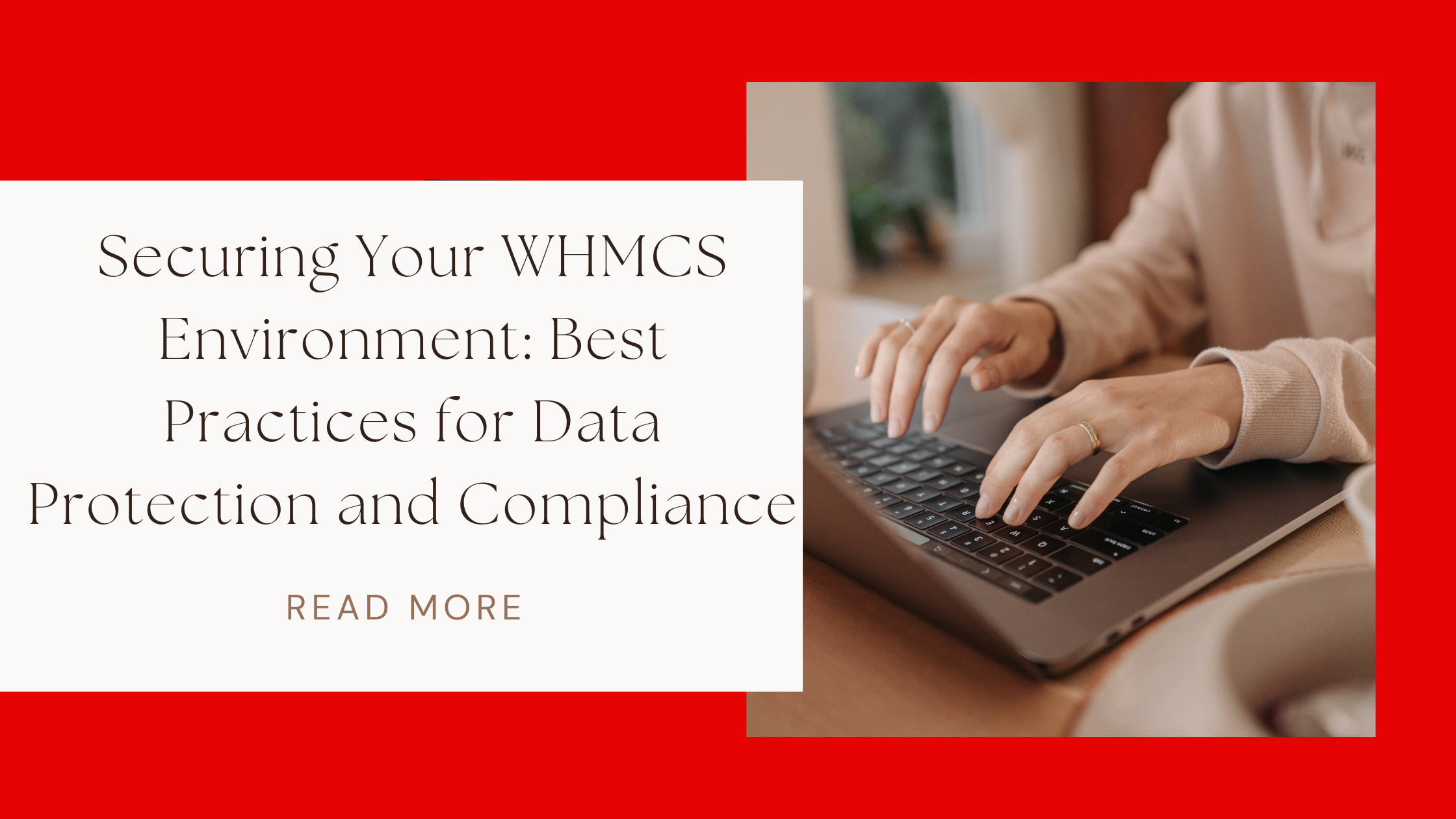Securing Your WHMCS Environment
Data breaches and cyberattacks are rising concerns in the web hosting industry. For businesses relying on WHMCS, ensuring the security of client data and compliance with legal standards is paramount. This article outlines actionable steps to secure your WHMCS installation and align with industry best practices, helping you protect sensitive information and maintain client trust.
Why Security Matters in WHMCS
WHMCS is a powerful tool for managing hosting operations, but its centralized nature makes it a high-value target for attackers. A breach could expose sensitive data, including client information, payment details, and server credentials, leading to reputational damage and financial losses.
Key Risks:
- SQL Injection Attacks: Exploiting vulnerabilities to access database information.
- Unauthorized Access: Using stolen credentials to infiltrate systems.
- Data Leaks: Weak encryption or misconfigured backups.
- Regulatory Penalties: Non-compliance with GDPR, PCI DSS, or other data protection laws.
By proactively addressing these risks, businesses can safeguard their operations and enhance client confidence.
Securing WHMCS: Best Practices
1. Implement Strong Authentication
The first line of defense is robust user authentication.
Steps:
- Enforce Strong Password Policies: Require a mix of uppercase, lowercase, numbers, and special characters.
- Enable Two-Factor Authentication (2FA): Use WHMCS’s built-in 2FA module for both staff and clients.
- Restrict IP Access: Limit admin area access to trusted IPs using .htaccess or server-level firewall rules.
Pro Tip: Regularly audit admin accounts and remove unused or inactive credentials.
2. Keep WHMCS and Modules Updated
Outdated software is a common entry point for attackers. WHMCS regularly releases updates to patch vulnerabilities and enhance security.
Checklist:
- Enable automatic updates for core WHMCS installations.
- Regularly review third-party modules for updates and security risks.
- Subscribe to WHMCS’s security mailing list for notifications.
Advanced Tip: Use a staging environment to test updates before applying them to production systems.
3. Secure Your Database
The database stores all critical WHMCS information, making it a prime target.
Best Practices:
- Use a Strong Database Password: Avoid default or weak credentials.
- Enable SSL Encryption: Ensure secure connections between WHMCS and the database.
- Restrict Database User Privileges: Grant only the necessary permissions for WHMCS operations.
- Regularly Backup Data: Store encrypted backups offsite and test restore processes periodically.
Pro Tip: Change default table prefixes to make SQL injection attacks harder.
4. Harden Your Server
Your hosting environment plays a significant role in WHMCS security.
Actions:
- Install a Web Application Firewall (WAF): Block malicious traffic and common threats like cross-site scripting (XSS).
- Enable Secure File Permissions: Ensure only authorized users can access critical WHMCS files.
- Use HTTPS Everywhere: Install SSL certificates for secure data transmission.
- Disable Directory Listing: Prevent attackers from viewing sensitive file structures.
Advanced Configuration: Consider isolating WHMCS on a dedicated server to minimize exposure to other applications.
5. Monitor and Audit Activity
Continuous monitoring can help identify and mitigate threats before they escalate.
Tools and Strategies:
- Enable Logging: Track admin actions and client logins via WHMCS’s built-in logging features.
- Use Intrusion Detection Systems (IDS): Detect suspicious activities on your server.
- Conduct Regular Security Audits: Review configurations, permissions, and access logs for anomalies.
Pro Tip: Set up real-time alerts for unusual activities, such as repeated failed login attempts.
Ensuring Compliance with Data Protection Regulations
Compliance isn’t just about avoiding penalties; it’s about building trust with your clients.
1. Understand Key Regulations
- GDPR (General Data Protection Regulation): Applies to businesses handling EU citizens’ data.
- PCI DSS (Payment Card Industry Data Security Standard): Governs the handling of payment information.
- CCPA (California Consumer Privacy Act): Focuses on consumer data rights in California.
2. WHMCS Features for Compliance
- Data Encryption: Encrypt sensitive fields in the database using WHMCS’s encryption settings.
- Data Retention Policies: Configure WHMCS to automatically delete old or unused data.
- Consent Tracking: Use customizable templates to collect and track user consent for data collection.
Pro Tip: Create a clear Privacy Policy and Terms of Service using WHMCS’s legal page tools.
Advanced Security Enhancements
1. Custom Security Modules
Develop or install custom modules tailored to your business needs. For instance:
- Advanced fraud detection.
- IP reputation monitoring.
2. Integrate with SIEM Tools
Connect WHMCS to Security Information and Event Management (SIEM) tools for centralized threat analysis and response.
3. Use Content Delivery Networks (CDN)
CDNs like Cloudflare provide DDoS protection and enhanced performance for WHMCS-hosted websites.
Preparing for Incident Response
Despite best efforts, breaches can still occur. An effective incident response plan minimizes damage.
Key Elements:
- Identify Threats: Use monitoring tools to detect potential breaches.
- Isolate Affected Systems: Prevent the spread of threats by isolating compromised areas.
- Notify Stakeholders: Inform clients, partners, and authorities as required by law.
- Recover Data: Use encrypted backups to restore operations.
- Post-Incident Review: Identify gaps and strengthen defenses.
Conclusion
Securing your WHMCS environment requires a combination of technical expertise, vigilance, and adherence to industry standards. By implementing the best practices discussed above, you can create a robust defense against cyber threats while maintaining compliance with data protection laws. In today’s digital-first world, security isn’t just an option—it’s a responsibility that ensures the longevity and success of your hosting business.

